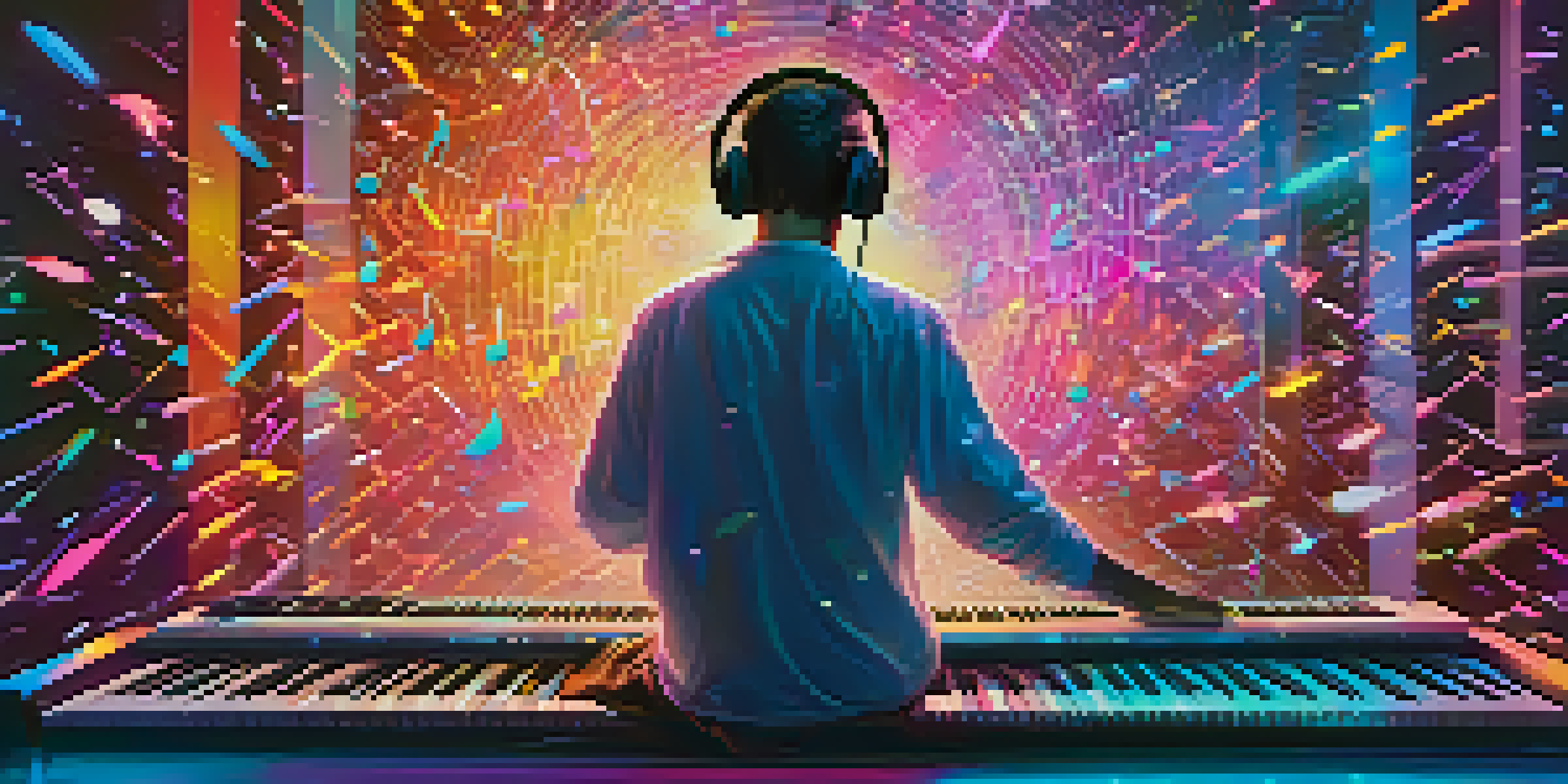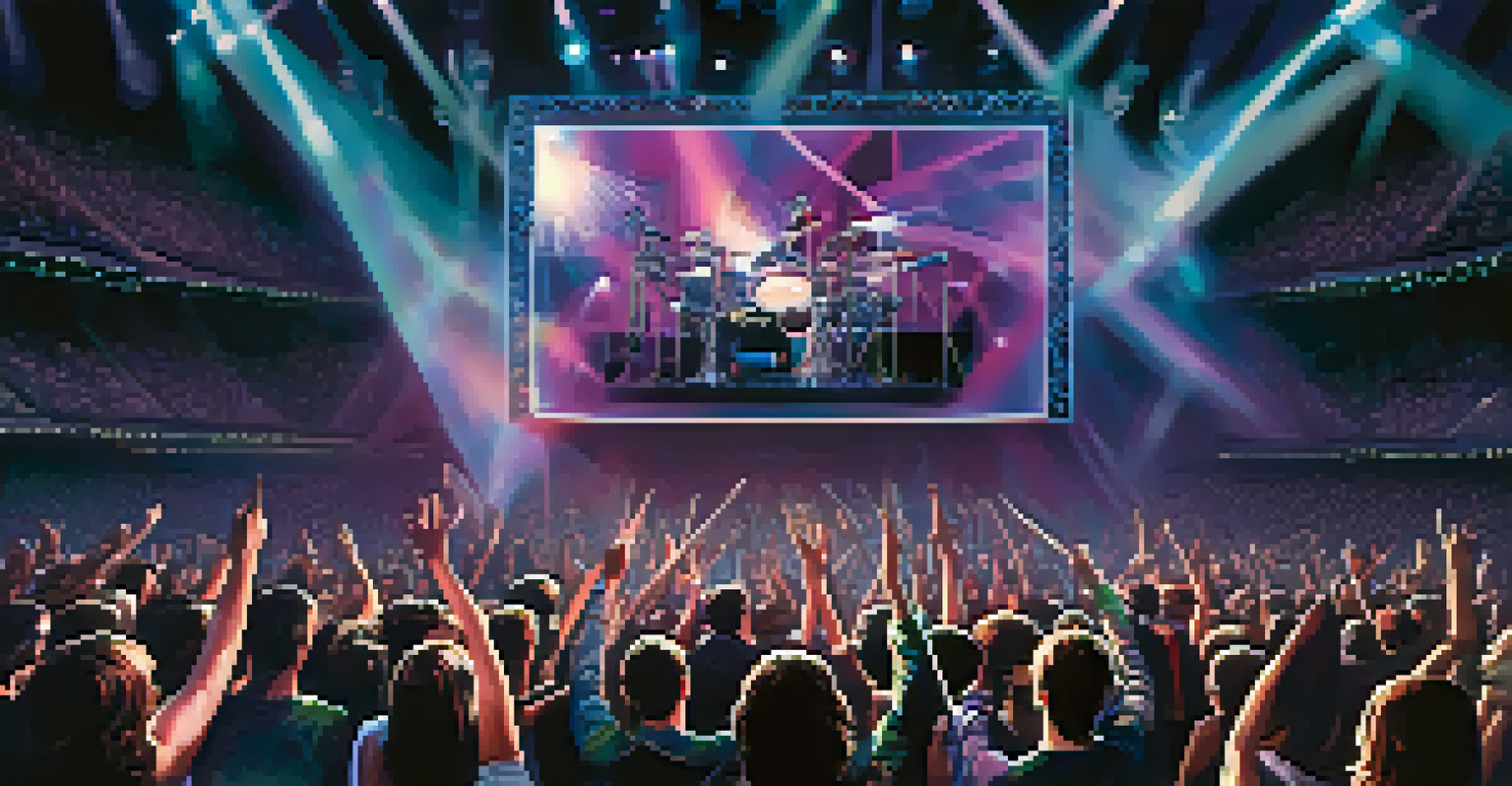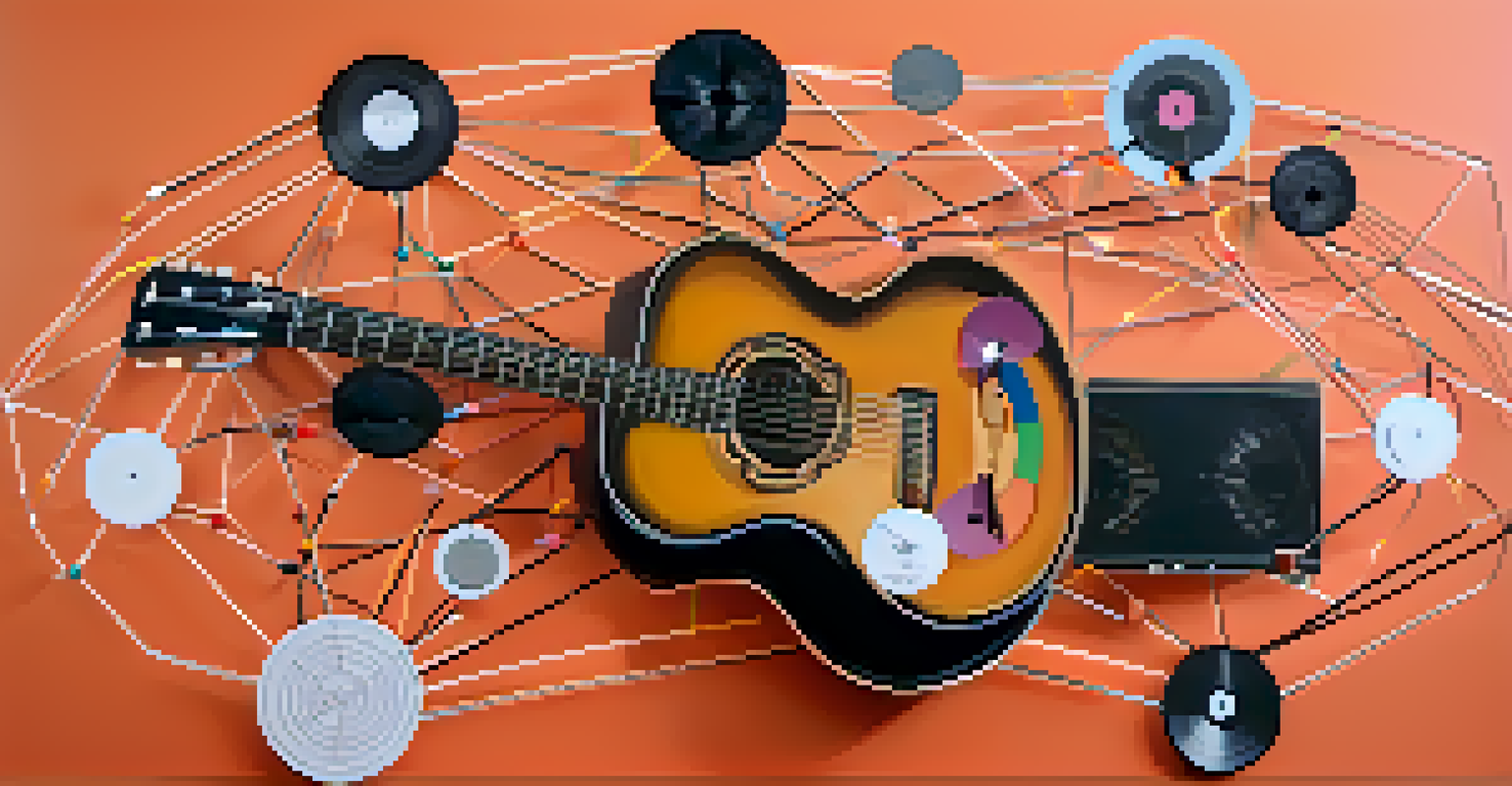NFTs in the Music Industry: IP Rights and Royalties

Understanding NFTs: A New Frontier in Music Ownership
Non-fungible tokens, or NFTs, represent unique digital assets verified through blockchain technology. In the music industry, this means artists can tokenize their work, creating a new form of ownership. Think of NFTs as digital collectibles that can't be duplicated, much like how an original painting differs from a print.
NFTs are a way for artists to take back control of their work and their revenue streams, transforming how we think about ownership in the digital age.
For musicians, this opens up exciting possibilities for revenue and fan engagement. Fans can purchase NFTs of their favorite songs, album art, or even concert tickets, creating a direct connection between artists and supporters. This shift not only empowers artists but also encourages a community spirit around their work.
Moreover, NFTs can encapsulate various rights, including IP rights and royalties, which makes them particularly appealing for artists looking to retain control over their creations. As we delve deeper into the music industry's landscape, it’s crucial to grasp how NFTs are redefining ownership and monetization.
Intellectual Property Rights and NFTs in Music
Intellectual property (IP) rights are essential for protecting an artist's work, allowing them to maintain control over its use and distribution. With NFTs, artists can embed specific rights directly into the token, clarifying how their music can be used. This ensures that if someone purchases an NFT, they clearly understand what they can and cannot do with that music.

For example, an artist might sell an NFT that grants the buyer the right to use a track in a video, while retaining the right to earn royalties from streaming. This level of clarity is something traditional licensing agreements often lack, making NFTs an attractive option for musicians. By leveraging NFTs, artists can streamline the process of granting rights while ensuring they receive fair compensation.
NFTs Redefine Music Ownership
NFTs enable artists to tokenize their work, creating unique digital assets that enhance ownership and fan engagement.
However, the legal landscape surrounding IP rights and NFTs is still evolving. Artists must be diligent in understanding the implications of their contracts and the specific rights they are transferring or retaining when they issue an NFT.
Royalties in the Age of NFTs: A New Revenue Stream
One of the most exciting aspects of NFTs in the music industry is the potential for new revenue streams through royalties. Traditionally, artists often struggle to receive fair compensation from streaming services, but NFTs can change that narrative. By creating NFTs that include built-in royalty mechanisms, artists can earn a percentage every time their work is resold in the secondary market.
The future of music lies in the hands of the artists who can engage with their fans in meaningful ways, and NFTs are a tool that can facilitate that connection.
This means that not only do artists benefit from the initial sale of their music NFTs, but they can also continue to profit as their work appreciates over time. Imagine an artist releasing a limited edition NFT of a hit song; as that song gains popularity, the NFT's value increases, and so do the artist's royalties.
This model promotes a more sustainable income structure for musicians, especially independent artists who rely heavily on direct sales. The ability to earn ongoing royalties from their work through NFTs could significantly impact how artists approach their careers and financial planning.
Challenges of Implementing NFTs in the Music Industry
While NFTs present exciting opportunities, they come with their own set of challenges. The process of minting NFTs can be technical and may require artists to familiarize themselves with blockchain technology. For many musicians, especially those less tech-savvy, this can be a daunting hurdle to overcome.
Additionally, the environmental impact of NFTs has raised concerns among artists and fans alike. The energy consumption associated with blockchain transactions can be substantial, prompting some to question the sustainability of this new technology. Finding eco-friendly solutions is essential for the widespread adoption of NFTs in the music industry.
Royalties Through NFT Resales
Artists can earn ongoing royalties from NFT resales, offering a sustainable income model that traditional streaming lacks.
Lastly, the volatility of the NFT market can be a double-edged sword. While some artists have seen incredible success, others may struggle to find buyers for their tokens. Navigating this unpredictable landscape requires artists to be strategic and informed about market trends.
Case Studies: Successful NFTs in Music
Several artists have successfully embraced NFTs, paving the way for others to follow. For instance, musician Grimes made headlines by selling digital art and music NFTs for millions, showcasing the potential for artists to generate significant income. Her success story highlights how NFTs can create buzz and attract attention to an artist's work.
Another noteworthy example is the band Kings of Leon, who released an NFT album that included exclusive perks like front-row seats to future shows. This innovative approach not only generated revenue but also deepened fan loyalty by offering a unique experience tied to the purchase of an NFT.
These case studies illustrate that while NFTs are still a nascent concept in the music industry, they can yield impressive results for artists willing to explore this new frontier. By learning from pioneers like Grimes and Kings of Leon, other musicians can better navigate the NFT landscape.
Fan Engagement and Community Building Through NFTs
NFTs are not just about ownership; they're also about fostering a deeper connection between artists and fans. By creating limited edition NFTs, musicians can offer their loyal supporters something truly special, whether that's exclusive content, behind-the-scenes access, or unique experiences. This can transform a one-way relationship into a vibrant community where fans feel valued.
Imagine being a die-hard fan who owns a unique NFT that grants you access to private listening parties or one-on-one video calls with your favorite artist. This level of engagement can create a sense of belonging and loyalty that traditional music sales simply cannot replicate.
Community Building via NFTs
NFTs foster deeper connections between artists and fans by providing exclusive experiences and content, transforming relationships into vibrant communities.
As artists explore the potential of NFTs, they can leverage these opportunities to build lasting relationships with their fans. This shift towards community engagement is revolutionizing the way musicians connect with their audience, making the experience more interactive and rewarding for everyone involved.
The Future of NFTs in the Music Industry
Looking ahead, the future of NFTs in the music industry appears promising but complex. As more artists and labels experiment with this technology, we can expect to see innovations that further enhance how music is created, shared, and monetized. The integration of NFTs could lead to a more equitable system for artists, where they have greater control over their work.
Moreover, as the technology matures, we might witness the emergence of platforms dedicated solely to music NFTs, simplifying the process for artists and fans alike. This could lead to a more streamlined marketplace, where discovering and purchasing music NFTs becomes as easy as streaming a song.

However, ongoing discussions about copyright, royalties, and environmental impact will shape how NFTs evolve in the music industry. Artists and industry stakeholders must work together to create a robust framework that supports both creativity and sustainability as we navigate this new digital landscape.